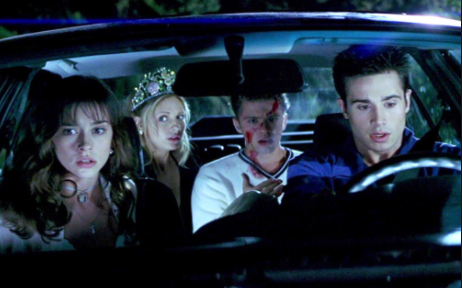At the time of its release in 1997, I Know What You Did Last Summer was coasting on the high of Kevin Williamson’s previous slasher classic, Scream. As a similarly constructed story, it seemed as though Williamson was far lazier with the building of suspense and the showcasing of gore in I Know What You Did Last Summer, which starred a then janker version of Neve Campbell, Jennifer Love Hewitt (little did Campbell know, the tables would turn in favor of her Party of Five co-star).
Though, granted, the thriller genre has gotten far more hair-raising in the near twenty years since I Know What You Did Last Summer came out, at least its contemporary, Scream, had far more iconically gruesome scenes (Drew Barrymore hanging inside out from a tree, anyone?) and just a tinge more perversity. Jim Gillespie, who only went on to direct three subsequent movies that most have never heard of (which makes him rife for teaching a class called something like Directing for Screenwriters), doesn’t do much to bring nervous anticipation to Williamson’s script. After all, Williamson was briefly as powerful of a screenwriter as Charlie Kaufman–this is also the period during which Dawson’s Creek was about to pop off in 1998.
And so, there is little stylization to the straightforward screenplay, iterating that perhaps a Wes Craven/Kevin Williamson pairing could never be topped. Nonetheless, Gillespie tries to make do with the standard formula for the slasher flick, particularly on the “hot girl gets killed first” front, with Sarah Michelle Gellar’s character, Helen Shivers, being among the more tortured of the friend quartet, which also consists of Julie James (Love Hewitt), porno-ly named Barry Cox (Ryan Phillippe) and Ray Bronson (Freddie Prinze Jr.). With Julie coupled up to Ray and Helen to Barry, it’s only natural that the four would build a bonfire on the beach the summer after their senior year of high school and proceed to attempt scaring one another with the classic urban legend about the man with the hook for a hand, usually called simply “The Hook.”
After Barry imbibes too much and thinks he can handle the sharp turns of the coastal roads (nicknamed, fittingly, Reaper’s Curve) of Southport Beach, Ray ends up driving Barry’s car; distracted by his antics in the backseat, it causes Ray to hit and kill a pedestrian crossing the street. The four friends, each with their own plans for the future that don’t include a murder conviction, decide to dispose of the body and never speak of it again. That is, until the following summer, after they’ve all drifted apart and Julie receives a note while back from college for the summer that ominously insists, “I know what you did last summer.” When Julie shows it to the others, Barry expresses the most skepticism about it, bringing the needed jaded perspective that every horror movie requires to relate to increasingly cynical audiences.
It isn’t until Barry gets run over by the psychotic killer seeking vengeance for what they don’t yet know that he starts to believe maybe Julie is right to be so terrified. Except Julie is really only lightly harassed in comparison to the others, merely sidled with the disposed of body of her friend, Max (Johnny Galecki), in the trunk of her car. And sure, maybe Ray doesn’t get too much intimidation, but he’s only a supporting character anyway. It’s more entertaining to watch Helen and Barry suffer, after all–which is probably why Jennifer Love Hewitt just gets stalked with the never-real threat of a hook to the jugular. And sure, she finds herself on the killer’s boat (there’s a reason he’s always in a fisherman’s slicker) at the end, whereupon she trips on a few corpses, but, all in all, Wendy Torrance in The Shining she is not.
Based on Lois Duncan’s 1973 novel of the same name, I Know What You Did Last Summer makes use of the original interpretation of “The Hook,” which became popular in the 1950s, and espoused the notion that the man’s interruption of a couple engaging in sexual behavior was a metaphor for his purpose as a societal moral compass. In I Know What You Did Last Summer, the killer serves the same purpose with regard to the manner in which Julie and her friends try to sweep a wrongdoing under the rug.
The revelation of who the killer is proves predictably disappointing, though his motives for continuing to hunt Julie and her friends down for running him over seem valid as he seethes, “When you leave a man for dead, you make sure he’s really dead.” Basically, he just wanted to die full-stop–is that so much to ask?




















